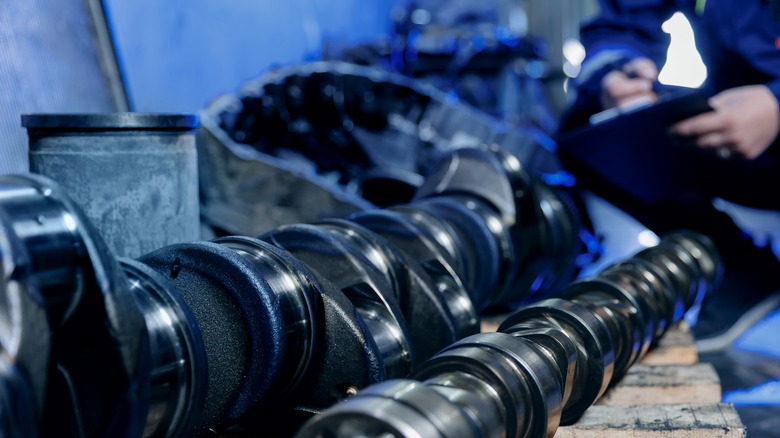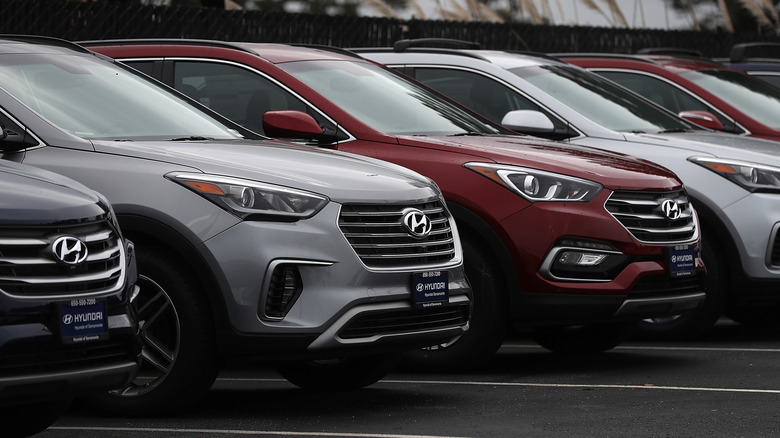
There have been times when carmakers went all out with an engine but lost, often with catastrophic consequences. For instance, the EcoBoost was once touted as the future of Ford engines but now is mired in failures, recalls, and lawsuits. But one engine single-handedly tarnished the carefully curated images of not one but two carmakers, costing them money and reputation. It's the Theta II series of engines used in Hyundai and Kia cars and SUVs.
The biggest problem with these engines was connecting rod bearing failure, which often led to catastrophic engine damage and, in some cases, even fires. This came as a surprise for many, especially given Hyundai's reputation for offering reliable engines, including the Theta I. Introduced in 2005 with the Hyundai Sonata, the Theta I laid the foundation for modern Hyundai engines, including the Theta II, which arrived in 2009. The Theta II engine went on to power most of Hyundai and Kia's popular sedans and SUVs.
At the launch of the 2.4-liter Theta II engine, the then-CEO of Hyundai Motor America, John Krafcik, said in a Hyundai press release that the new engine "demonstrates Hyundai's commitment to delivering products that excite and reward Hyundai owners." A statement that aged like milk.
 Parilov/Shutterstock
Parilov/Shutterstock
The issues with the Theta II 2.0-liter and 2.4-liter gasoline direct injection engines started at Hyundai's manufacturing facility in Alabama. According to the National Highway Traffic Safety Administration, certain manufacturing processes like crankshaft machining results in metallic debris. In this case, the crankshaft was not properly cleaned, leading to the presence of metallic debris left inside the engine.
This would lead to bearing wear and consequently, connecting rod failure. At the least, the outcome was excessive engine oil consumption and unexpected engine stalling. At worst, it led to catastrophic engine failure. In some cases, the connecting rod would damage the engine block and the resultant oil leak posed a fire hazard once it came in contact with surrounding hot surfaces.
Anyone with a whiff of engine repair knowledge will tell you that the presence of metallic debris in an engine is a disaster waiting to happen. These metal fragments scour engine internals, causing irreversible damage. The debris also gets into oil passages and blocks them, resulting in reduced oil flow to critical parts, causing the engine to seize. Customers faced issues with new vehicles stalling at high speeds due to engine blowouts. In some cases, the entire engine needed replacement but dealers refused to cover it under warranty. (While that's horrible, there are even worse car dealer stories.)
 Justin Sullivan/Getty Images
Justin Sullivan/Getty Images
The fallout was explosive. Class action lawsuits against Hyundai and Kia started popping up. In September 2015, Hyundai issued a recall for 470,000 Sonatas manufactured from 2010 to 2011 and running 2.0-liter and 2.4-liter Theta II engines. This was followed by a recall in March 2017 that involved 572,000 Sonatas and Santa Fe Sports made from 2013 to 2014,. At the same time, Kia issued a recall for its Optima (2011-2014), Sorento (2012-2014), and Sportage (2011-2013), a total of 618,160 vehicles.
The tinder in the powder keg came in the form of a whistleblower, a Hyundai safety engineer. He filed a report with the National Highway Transportation Safety Administration citing the delay from Hyundai and Kia in issuing a timely recall. An unlikely hero, like the Tesla whistleblower.
In the end, the Theta II engine cost Hyundai and Kia over $2 billion in the form of fines, lawsuit settlements, recalls, engine replacements, and offering increased warranty on engines. It's a gift that keeps on giving. The only winner in this entire debacle was the whistleblower, who received a cool $24 million from the NHTSA.














